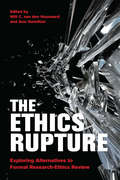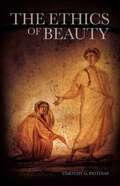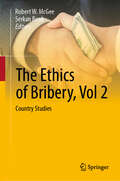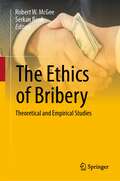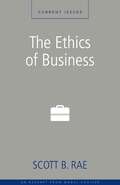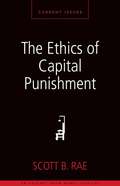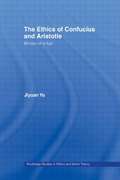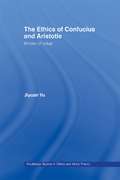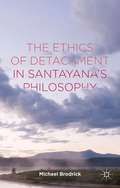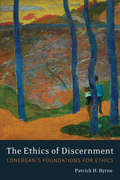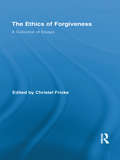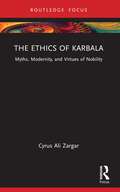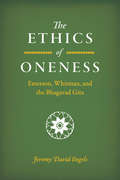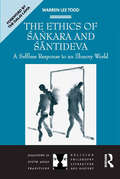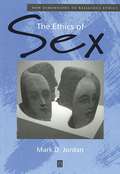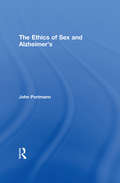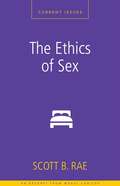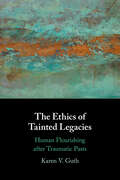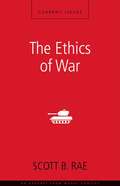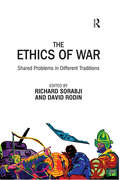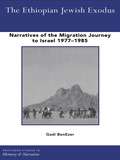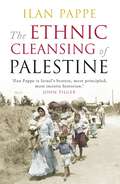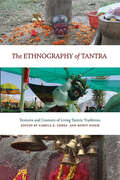- Table View
- List View
The Ethics Rupture: Exploring Alternatives to Formal Research-Ethics Review
by Ann Hamilton Will C. van den HoonaardFor decades now, researchers in the social sciences and humanities have been expressing a deep dissatisfaction with the process of research-ethics review in academia. Continuing the ongoing critique of ethics review begun in Will C. van den Hoonaard's Walking the Tightrope and The Seduction of Ethics, The Ethics Rupture offers both an account of the system's failings and a series of proposals on how to ensure that social research is ethical, rather than merely compliant with institutional requirements.Containing twenty-five essays written by leading experts from around the world in various disciplines, The Ethics Rupture is a landmark study of the problems caused by our current research-ethics system and the ways in which scholars are seeking solutions.
The Ethics of Beauty
by Timothy G. PatitsasChaste and ardent eros for the Beautiful is the first task of human life, and falling in love with Beauty is the beginning of every adventure that matters …. <p><p>In The Ethics of Beauty, Orthodox Christian theologian Timothy Patitsas first considers Beauty’s opposite, the dark events that traumatize victims of war and other ugly circumstances, and then invites us to rediscover the older Beauty-first response to moral questions and the integrity of the soul. Covering topics ranging from creation to political theory to the Jesus Prayer, including war, psychology, trauma, chastity, healthy shame, gender, marriage, hospitality, art, architecture, theology, economics, urban planning, and complexity theory, The Ethics of Beauty lays out a worldview in which Beauty, Goodness, and Truth are each embraced as indispensable elements of the best possible human life.
The Ethics of Bribery, Vol 2: Country Studies
by Robert W. McGee Serkan BenkWhile most people assume that all bribery is unethical, the literature provides examples and philosophical arguments to support the proposition that some bribery may actually be ethical, based on utilitarian grounds. This book provides a theoretical and empirical examination of bribery from an ethical perspective. Complimentary to The Ethics of Bribery: Theoretical and Empirical Studies, this book offers a multi-country, multi-regional comparison to determine whether views toward bribery differ by geographic location. This includes case studies from USA, Japan, China, Russia, the MENA region, developed and developing countries, among others.
The Ethics of Bribery: Theoretical and Empirical Studies
by Robert W. McGee Serkan BenkWhile most people assume that all bribery is unethical, the literature provides examples and philosophical arguments to support the proposition that some bribery may actually be ethical, based on utilitarian grounds. This book provides a theoretical and empirical examination of bribery from an ethical perspective. It examines empirical data from over 80 countries and reports on attitudes toward bribery examining demographic variables such as gender, age, ethnicity, education, income level, religion and social class. Multi-country comparisons are provided to determine whether views toward bribery differ by geographic location.
The Ethics of Business: A Zondervan Digital Short
by Scott RaeDerived from Scott B. Rae’s widely adopted textbook, Moral Choices, this digital short looks carefully at economic life in the Bible and at a range of economic and business issues including wealth, materialism, work, calling, capitalism, human resources management, product safety, and more. Rae covers moral and theological principles for a biblically ordered economic life, and also includes cases and questions for further discussion. The Ethics of Business thus provides a wise and well-grounded introduction to an everyday ethical question for Christians, namely, “How can I best serve God in my work and finances?”
The Ethics of Capital Punishment: A Zondervan Digital Short
by Scott RaeDerived from Scott B. Rae’s widely adopted textbook, Moral Choices, this digital short looks carefully at the Bible’s teaching on capital punishment and at arguments for and against it. With cases and questions for further discussion at the end, The Ethics of Capital Punishment provides a wise and well-grounded introduction to a key public policy-related ethical question, namely, “Can a Christian in good conscience support capital punishment today?”
The Ethics of Confucius And Aristotle: Mirrors of Virtue
by Jiyuan YuFurthermore, this work focuses on singling out the most significant issues which not only are commonly exploited in these two ethics, but are also of great interest in contemporary virtue ethics. I first became interested in this subject in 1996 when Nicholas Bunnin invited me to speak at a conference on Chinese philosophy that he organized at Oxford University. By that time, Aristotle’s Nicomachean Ethics had been intensively studied as the most important model of virtue ethics for decades. As a student of Aristotle, when I turned my eyes to Chinese philosophy, the first thing I noticed is how similar the Confucian approach to ethics is to Aristotle’s in many aspects. Hence I chose to present a paper dealing with how Aristotle and Confucius conceive the conception of virtue. The paper was later published in the Philosophy East and West 48 (1998), with the title of ‘‘Virtue: Aristotle and Confucius.’’ It became the seed of this book.
The Ethics of Confucius and Aristotle: Mirrors of Virtue (Routledge Studies in Ethics and Moral Theory #7)
by Jiyuan YuAs a comparative study of the virtue ethics of Aristotle and Confucius, this book explores how they each reflect upon human good and virtue out of their respective cultural assumptions, conceptual frameworks, and philosophical perspectives. It does not simply take one side as a framework to understand the other; rather, it takes them as mirrors for each other and seeks to develop new readings and perspectives of both ethics that would be unattainable if each were studied on its own.
The Ethics of Detachment in Santayana’s Philosophy
by Michael BrodrickGerman philosopher Arthur Schopenhauer wrote in 1818 that true happiness is impossible without inner peace. Around a hundred years later, after studying Schopenhauer, American philosopher George Santayana explained in detail how we can achieve inner peace through a special activity he called 'spirituality'. While Santayana's theory of spirituality is not well known today, it holds great promise for improving our lives. A form of momentary detachment from ideals and values, spirituality frees us to enjoy what there is, without judging it. Brodrick clarifies and completes Santayana's account of spirituality, while suggesting how spirituality can relieve human suffering, enrich our daily lives, and even make us better human beings. The finitude of the world and our own finitude mean that nothing in this life will ever be perfect, but spirituality reveals that, in a sense, everything is good enough as it is.
The Ethics of Discernment
by Patrick H. ByrneIn The Ethics of Discernment, Patrick H. Byrne presents an approach to ethics that builds upon the cognitional theory and the philosophical method of self-appropriation that Bernard Lonergan introduced in his book Insight, as well as upon Lonergan's later writing on ethics and values.Extending Lonergan's method into the realm of ethics, Byrne argues that we can use self-appropriation to come to objective judgements of value. The Ethics of Discernment is an introspective analysis of that process, in which sustained ethical inquiry and attentiveness to feelings as "intentions of value" leads to a rich conception of the good.Written both for those with an interest in Lonergan's philosophy and for those interested in theories of ethics who have only a limited knowledge of Lonergan's work, Byrne's book is the first detailed exposition of an ethical theory based on Lonergan's philosophical method.
The Ethics of Forgiveness: A Collection of Essays (Routledge Studies in Ethics and Moral Theory)
by Christel FrickeWe are often pressed to forgive or in need of forgiveness: Wrongdoing is common. Even after a perpetrator has been taken to court and punished, forgiveness still has a role to play. How should a victim and a perpetrator relate to each other outside the courtroom, and how should others relate to them? Communicating about forgiveness is particularly urgent in cases of civil war and crimes against humanity inside a community where, if there were no forgiveness, the community would fall apart. Forgiveness is governed by social and, in particular, by moral norms. Do those who ask to be forgiven have to fulfil certain conditions for being granted forgiveness? And what does the granting of forgiveness consist in? We may feel like refusing to forgive those perpetrators who have committed the most horrendous crimes. But is such a refusal justified even if they repent their crimes? Could there be a duty for the victim to forgive? Can forgiveness be granted by a third party? Under which conditions may we forgive ourselves? The papers collected in the present volume address all these questions, exploring the practice of forgiveness and its normative constraints. Topics include the ancient Chinese and the Christian traditions of forgiveness, the impact of forgiveness on the moral dignity and self-respect of the victim, self-forgiveness, the narrative of forgiveness as well as the limits of forgiveness. Such limits may arise from the personal, historical, or political conditions of wrongdoing or from the emotional constraints of the victims.
The Ethics of Karbala: Myths, Modernity, and Virtues of Nobility (Islam in the World)
by Cyrus Ali ZargarThe Ethics of Karbala investigates the relationship between sacred narratives and the development of character. Focusing on the warrior ethos expressed in accounts of the Battle of Karbala, Zargar searches for the place of the martial virtues in modern life and warfare.This book is the first of its kind in taking a virtue ethics approach to the study of Islamic history. It offers an ethical analysis of arguably the most pivotal moment in Islamic history. To do so, it makes use of interdisciplinary methods, especially global philosophy and religious studies, and draws on philosophical concepts spanning from Nietzsche to Iqbal. The book’s clear and engaging prose makes it accessible to readers seeking a profound understanding of intersections between practical philosophy and religious myths.This book targets upper-level undergraduate readers seeking to discover Islamic ethics. It will serve nonspecialists, specialists in Shiʿi Islamic studies, and all those interested in Islamic ethics, virtue ethics, cross-cultural philosophy, Nietzsche studies, military science, and religious studies.
The Ethics of Oneness: Emerson, Whitman, and the Bhagavad Gita
by Jeremy David EngelsWe live in an era defined by a sense of separation, even in the midst of networked connectivity. As cultural climates sour and divisive political structures spread, we are left wondering about our ties to each other. Consequently, there is no better time than now to reconsider ideas of unity. In The Ethics of Oneness, Jeremy David Engels reads the Bhagavad Gita alongside the works of American thinkers Ralph Waldo Emerson and Walt Whitman. Drawing on this rich combination of traditions, Engels presents the notion that individuals are fundamentally interconnected in their shared divinity. In other words, everything is one. If the lessons of oneness are taken to heart, particularly as they were expressed and celebrated by Whitman, and the ethical challenges of oneness considered seriously, Engels thinks it is possible to counter the pervasive and problematic American ideals of hierarchy, exclusion, violence, and domination.
The Ethics of Sankara and Santideva: A Selfless Response to an Illusory World (Dialogues in South Asian Traditions: Religion, Philosophy, Literature and History)
by Warren Lee ToddExploring the philosophical concerns of the nature of self, this book draws from two of the most influential Indian masters, Śaṅkara and Śāntideva. Todd demonstrates that an ethics of altruism is still possible within a metaphysics which assumes there to be no independent self. A new ethical model based on the notions of ’flickering consciousness’ and ’constructive altruism’ is proposed. By comparing the metaphysics and ethics of Śaṅkara and Śāntideva, Todd shows that the methodologies and aims of these Buddhist and Hindu masters trace remarkably similar cross-cutting paths. Treating Buddhism and Hinduism with equal respect, this book compares and reinterprets the Indian material so as to engage with contemporary Western debates on self and to show that Indian philosophy is indeed a philosophy of dialogue.
The Ethics of Sex (New Dimensions to Religious Ethics)
by Mark D. JordanMark Jordan has written a provocative and stimulating introduction to the issues surrounding sexual ethics and sexuality and theology, filling a much-needed void in this field. Jordan summarizes key topics and themes in the teaching and discussion of religious ethics as well as pushing forward the debate in interesting and original directions.
The Ethics of Sex and Alzheimer's
by John PortmannA growing epidemic, Alzheimer’s punishes not only its victims but also those married to them. This book analyzes how Alzheimer’s is quietly transforming the way we think about love today. Without meaning to become rebels, many people who find themselves "married to Alzheimer’s" deflate the predominant notion of a conventional marriage. By falling in love again before their ill spouse dies, those married to Alzheimer’s come into conflict with central values of Western civilization – personal, sexual, familial, religious, and political. Those who wait sadly for a spouse’s death must sometimes wonder if the show of fidelity is necessary and whom it helps. Most books on Alzheimer’s focus on those who have it, as opposed to those who care for someone with it. This book offers a powerful and searching meditation on the extent to which someone married to Alzheimer’s should be expected to suffer loneliness. The diagnosis of dementia should not amount to a prohibition of sexual activity for both spouses. Portmann encourages readers to risk honesty in assessing the moral dilemma, using high-profile cases such as Nancy Reagan and Justice Sandra Day O'Connor to illustrate the enormity of the problem. Ideal for classes considering the ethics of aging and sexuality.
The Ethics of Sex: A Zondervan Digital Short
by Scott RaeDerived from Scott B. Rae’s widely adopted textbook, Moral Choices, this digital short looks carefully at the Bible’s teaching on sexual ethics and at specific issues like singleness, homosexuality, same-sex marriage, birth control, masturbation, and more. Confronting head-on some of the most difficult topics for Christians to navigate, Rae also includes cases and questions for further discussion. The Ethics of Sex thus provides wise and well-grounded instruction to an ethical question every Christian must answer, namely, “How can I please God in my sexual behavior?”
The Ethics of Tainted Legacies: Human Flourishing after Traumatic Pasts
by Karen V. GuthWhat do we do when a beloved comedian known as “America's Dad” is convicted of sexual assault? Or when the man who wrote “all men are created equal” owned slaves? Or when priests are exposed as pedophiles? From the popular to the political to the profound, each day brings new revelations that respected people, traditions, and institutions are not what we thought they were. Despite the shock that these revelations produce, this state of affairs is anything but new. The problem of what to do when those we revere are shown to be compromised is a fundamental existential condition. In this book, Karen V. Guth identifies “tainted legacies” as a pressing contemporary moral problem and ethical challenge. Constructing a typology of responses to compromised thinkers, traditions, and institutions, she demonstrates the relevance of age-old debates in Christian theology for those who confront legacies tarnished by the traumas of slavery, racism, and sexual violence.
The Ethics of War: A Zondervan Digital Short
by Scott RaeDerived from Scott B. Rae’s widely adopted textbook, Moral Choices, this digital short looks carefully at war in the Bible and at major Christian views on war, including pacifism, nonviolence and nonparticipation, and Just War theory. Not afraid to tackle hot-button issues like nuclear weapons and waterboarding, Rae also includes cases and questions for further discussion. The Ethics of Business thus provides a wise and well-grounded introduction to a key ethical question for Christians, namely, “Can I support or participate in war?”
The Ethics of War: Shared Problems in Different Traditions
by David Rodin Richard Sorabji9/11 and the subsequent invasions of Afghanistan and Iraq have left many people baffled and concerned. This interdisciplinary study of the ethics of war provides an excellent orientation not only to present, but also to future conflicts. It looks both back at historical traditions of ethical thought and forward to contemporary and emerging issues. The Ethics of War traces how different cultures involved in present conflicts have addressed similar problems over the centuries. Distinguished authors reflect how the Graeco-Roman world, Byzantium, the Christian just war tradition, Islam, Judaism, Hinduism and the Geneva Conventions have addressed recurrent ethical problems of war. Cutting-edge essays by prominent modern theorists address vital contemporary issues including asymmetric war, preventive war, human rights and humanitarian intervention. Distinguished academics, ethical leaders, and public policy figures have collaborated in this innovative and accessible guide to ethical issues in war.
The Ethiopian Jewish Exodus: Narratives of the Journey (Routledge Studies in Memory and Narrative)
by Gadi BenEzerBetween 1977 and 1985, some 20,000 Ethiopian Jews left their homes in Ethiopia and - motivated by an ancient dream of returning to the land of their ancestors, 'Yerussalem' - embarked on a secret and highly traumatic exodus to Israel. Due to various political circumstances they had to leave their homes in haste, go a long way on foot through unknown country, and stay for a period of one or two years in refugee camps, until they were brought to Israel. The difficult conditions of the journey included racial tensions, attacks by bandits, night travel over mountains, incarceration, illness and death. A fifth of the group did not survive the journey.This interdisciplinary, ground-breaking book focuses on the experience of this journey, its meaning for the people who made it, and its relation to the initial encounter with Israeli society. The author argues that powerful processes occur on such journeys that affect the individual and community in life-changing ways, including their initial encounter with and adaptation to their new society. Analysing the psychosocial impact of the journey, he examines the relations between coping and meaning, trauma and culture, and discusses personal development and growth.
The Ethnic Cleansing of Palestine
by Ilan PappeThe book that is providing a storm of controversy, from &‘Israel&’s bravest historian&’ (John Pilger)Renowned Israeli historian, Ilan Pappe's groundbreaking work on the formation of the State of Israel. 'Along with the late Edward Said, Ilan Pappe is the most eloquent writer of Palestinian history.' NEW STATESMAN Between 1947 and 1949, over 400 Palestinian villages were deliberately destroyed, civilians were massacred and around a million men, women, and children were expelled from their homes at gunpoint. Denied for almost six decades, had it happened today it could only have been called 'ethnic cleansing'. Decisively debunking the myth that the Palestinian population left of their own accord in the course of this war, Ilan Pappe offers impressive archival evidence to demonstrate that, from its very inception, a central plank in Israel&’s founding ideology was the forcible removal of the indigenous population. Indispensable for anyone interested in the current crisis in the Middle East. *** 'Ilan Pappe is Israel's bravest, most principled, most incisive historian.' JOHN PILGER 'Pappe has opened up an important new line of inquiry into the vast and fateful subject of the Palestinian refugees. His book is rewarding in other ways. It has at times an elegiac, even sentimental, character, recalling the lost, obliterated life of the Palestinian Arabs and imagining or regretting what Pappe believes could have been a better land of Palestine.' TIMES LITERARY SUPPLEMENT 'A major intervention in an argument that will, and must, continue. There's no hope of lasting Middle East peace while the ghosts of 1948 still walk.' INDEPENDENT
The Ethnography of Tantra: Textures and Contexts of Living Tantric Traditions
by Rohit Singh Carola E. LoreaThis is the first collection of essays to approach the topic of Tantric Studies from the vantage point of ethnography and lived religion, moving beyond the centrality of written texts and giving voice to the everyday life and livelihoods of a multitude of Tantric actors. Bringing together a team of international scholars whose contributions range across diverse communities and traditions in South Asia, Southeast Asia, and the Himalayan region, the book connects distant shores of Tantric scholarship and lived Tantric practices. The contributors unpack Tantra’s relationship to the body, ritual performance, sexuality, secrecy, power hierarchies, death, magic, and healing, while doing so with vigilant sensitivity to decolonization and the ethics of fieldwork. Through diverse ethnographies of Tantra and attention to lived experiences and life stories, the book challenges normative definitions of Tantra and maps the variety of Tantric traditions, providing comparative perspectives on Tantric societies across regions and religious backgrounds. The accessible tone of the ethnographic case studies makes this an ideal book for undergraduate or graduate audiences working on the topic of Tantra.
The Eucharist Makes the Church: Henri De Lubac and John Zizioulas In Dialogue
by Paul McpartlanThis original and wide-ranging study treats many of the deepest theological issues in modern ecumenism, including our understanding of the Trinity and the nature of primacy, in a vigorous and accessible fashion.
The Eucharist in Medieval Canon Law
by Thomas M. IzbickiThomas Izbicki presents a new examination of the relationship between the adoration of the sacrament and canon law from the twelfth to fifteenth centuries. The medieval Church believed Christ's glorified body was present in the Eucharist, the most central of the seven sacraments, and the Real Presence became explained as transubstantiation by university-trained theologians. Expressions of this belief included the drama of the elevated host and chalice, as well as processions with a host in an elaborate monstrance on the Feast of Corpus Christi. These affirmations of doctrine were governed by canon law, promulgated by popes and councils; and liturgical regulations were enforced by popes, bishops, archdeacons and inquisitors. Drawing on canon law collections and commentaries, synodal enactments, legal manuals and books about ecclesiastical offices, Izbicki presents the first systematic analysis of the Church's teaching about the regulation of the practice of the Eucharist.
